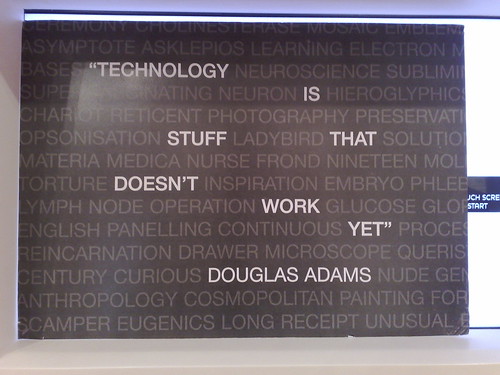So, once upon I worked at this massive corporation with a name known worldwide. It started with a big red H. Things were going well. I loved going to work – of course, there were sucky days too, but I loved going to work. I got to work on really cool problems. I was appreciated. I got to sit down with great minds and learn from them, and really, that’s what I enjoy – learning stuff. It was like playing. In fact, I played with problems. Sure, I had to apply the stuff I learned, but that’s learning too – from theory to practical.
And I had a manager who let me do that, and I thrived. Granted, there were days when middle-management and upper-management had frowns, but they smiled more than they frowned and we understood each other.
Then, we got bought out and the ‘restructuring’ happened. So I got a new boss, aptly named Rex. He walks into the lab one day – he was always perturbed I wasn’t in my cube but instead in the lab – and he says,
“Taran, you need to work on <insert this project here> because it’s <insert someone else’s excuse here> and we need it done now.”
And I said, “OK – I’ll play with it after lunch!”
And T. Rex said, “We don’t play here at <insert company name that starts with big red H>. We work.”
I stared at him.
I saw a man willing to suck the joy out of what I got paid for in some misguided thought that it would increase my productivity – staring at a screen like a drone. The fun is the zone. You can be doing the most horrible thing in the world, but if you’re having fun doing it, you’ll get it done.
I was wrong. He was simply catering to someone else, assuming I was that someone else, and trying to lead what he thought of was someone who would quickly get out of his control and start making his life interesting, which could also be a code word for bad by his read.
And maybe – just maybe – statistically, he was gambling the right way. Just maybe. Sure, he would have lost the bet with me (in fact, he did), but he was erring on the side he likely most experienced.
But how could you not enjoy what you do? We’ve all done things that we didn’t enjoy, but exactly when did people start making a habit of doing that?
We had a team that played well together. We had a way of making things work, all with our own different skill-sets, abilities and talents that somehow worked.
I wasn’t the first to go, but I did go, and when someone asked me when I had decided to leave, it was that day that Rex and I had that brief conversation.
I don’t regret the decision. I do regret being forced to make that decision. I scored high in every review, got stuff done, was promoted a few times, etc. Sure, I wasn’t special. Sure, I didn’t deserve special treatment.
But why is not being miserable considered special treatment?


![An update / upgrade is available for your [linux / windows / mac] computer...via @stickycomics](https://farm6.staticflickr.com/5176/5497202855_6e785e0c38.jpg)



